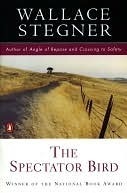What do you think?
Rate this book


226 pages, Kindle Edition
First published January 1, 1976

They sit in lace-curtained parlors and tsk-tsk on an indrawn breath, they know every unwanted pregnancy in town sooner than the girl does, they want English teachers in Augustana College fired for assigning A Farewell to Arms, they wrote the Volstead Act.
I was reminded of a remark of Willa Cather's, that you can't paint sunlight, you can only paint what it does with shadows on a wall. If you examine a life, as Socrates has been so tediously advising us to do for so many centuries, do you really examine the life, or do you examine the shadows it casts on other lives? Entity or relationships? Objective reality or the vanishing point of a multiple perspective exercise? Prism or the rainbows it refracts? And what if you're the wall? What if you never cast a shadow or rainbow of your own, but have only caught those cast by others?
That is the way the modern temper would read me. Babbitt, the man who in all his life never did one thing he really wanted to. One of those Blake was scornful of, who controlled their passions because their passions are feeble enough to be controlled. One of those Genteel Tradition characters whose whole pale ethos is subsumed in an act of renunciation.
[...] I felt an uneasy adolescent peeking from behind my old-age make-up, as if I were a sixteen-year-old playing Uncle Vanya in the high school play [...]
"I was reminded of a remark of Willa Cather's, that you can't paint sunlight, you can only paint with what it does with shadows on a wall. If you examine a life, as Socrates has been so tediously advising us to do for so many centuries, do you really examine the life, or do you examine the shadows it casts on other lives? Entity or relationships? Objective reality or the vanishing point of multiple perspective exercise? Prism or the rainbows it refracts? And what if you're the wall? What if you never cast a shadow or rainbow of your own, but have only caught those cast by others?"
Crucifixion can be discussed philosophically until they start driving in nails. Young, middle-aged or getting old, Joe Allston has always been full of himself, uncertain, dismayed, dissatisfied with his life, his country, his civilization, his profession, and himself. He has always been hungry for some continuity and assurance and sense of belonging, but has never had ancestors or descendents or place in the world.Well, I suppose we all feel that way from time to time, but the trick is to acknowledge this is normal and human, ride it out and move on. It's something Allston struggles to do in this book.